Impact Stories from Environmental Sustainability Policy Area

Fellow recognized for achievements in engineering
Fellow(s): Joy Makumbe
Country: Zimbabwe
Cohort: 2015
Policy Area(s): Empowering Women and Girls, Environmental Sustainability, Professional Growth
2015 fellow Joy Makumbe was recently featured by Visibility STEM Africa, an initiative that amplifies the voices of STEM leaders and inspires young Africans to pursue careers in STEM fields. Joy, a water sanitation engineer, currently works for Egis Group. She recently completed a water sanitation project in Tanzania, leading a team in the construction of water pump stations, guard houses, electro-mechanical improvements and more.
In her feature, Joy spoke about her passion for creating community impact through bringing water and sanitation solutions to the African continent. Joy also gave advice to young Africans who are interested in STEM: “You can! Be tough. Don’t give up. Don’t look back. Remember, there is always someone to hold your hand along the journey,” she said.
Report Date...: 9/28/20

Fellows come together in online conference to inspire girls
Fellow(s): Gisele Beatrice Sonfack, Oluremi Hamid, Saida Yusupova, Lamia Fikrat
Country: Cameroon, Morocco, Nigeria, Uzbekistan
Cohort: 2016, 2019
Policy Area(s): Education Diplomacy/Mentoring, Empowering Women and Girls, Entrepreneurship, Environmental Sustainability, Professional Growth, Youth Engagement
2016 fellow of Cameroon Gisele Beatrice Sonfack recently gathered TechWomen fellows from Morocco, Nigeria and Uzbekistan to share their stories as women in engineering and speak about ways to inspire the next generation of girls. Gisele is the founder of Women in Engineering and Technology (WENTECH), an association that organizes workshops and conferences with a mission to inspire girls interested in STEM fields.
The online conference featured Gisele as well as 2016 fellow of Nigeria and CEO of Hydren Energy Oluremi Hamid, 2016 fellow of Uzbekistan and CEO of Green Business Innovation Saida Yusupova and 2019 fellow of Morocco Lamia Fikrat, a renewable energy and environment consultant. The audience, mostly comprised of young students and their parents, learned about the gender gap in STEM fields and why women have been historically underrepresented. Each fellow described their pathway to success, sharing how they remained motivated despite being outnumbered by men in their fields. They also answered questions from the students, encouraging them to pursue their interests and passions. Despite the cancelation of WENTECH’s scheduled in-person conferences, Gisele hopes to organize and record bi-monthly virtual conferences, making them available for a wider audience of girls.
Report Date...: 9/7/20
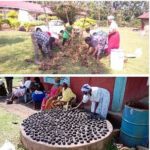
Fellow launches agro-waste initiative to empower rural women
Fellow(s): Linah Anyango
Country: Kenya
Cohort: 2019
Policy Area(s): Education Diplomacy/Mentoring, Empowering Women and Girls, Entrepreneurship, Environmental Sustainability, Professional Growth
In rural Kenya, women walk long distances to collect firewood for cooking in their homes. 2019 fellow Linah Anyango wanted to create a solution that would not only provide cleaner, cheaper and more renewable energy sources, but also bring income to the women and their communities. Her newly launched CBO, Kanyadhiang’ Briquettes Nyale – which translates to “Briquettes are our solution” – aims to use readily available agricultural waste to provide sustainable fuel for women in rural Kenya.
Inspiration for the project began with the Girls in STEM Club that Linah founded at her school. Together, Linah and her students create clean energy solutions from waste products, including using charcoal dust to make briquettes. “I extended this project to women in rural parts of Kenya, since women are the most affected when it comes to access to clean and renewable energy,” she says.
This month, Linah hosted a one-week training where she guided groups of women in making briquettes from agricultural waste. The training focused on making briquettes from water hyacinth, an invasive plant species that threatens water sources and creates health risks. Moving forward, Linah will use her network to help the women sell their briquettes. “Ensuring that women and girls have energy access is not just about women’s rights – it’s a fundamental human rights issue,” she says.
Report Date...: 8/31/20
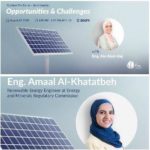
Fellows collaborate for webinar on solar energy
Fellow(s): Aia Abul-Haj and Amaal Al-Khatabeh
Country: Jordan
Cohort: 2018
Policy Area(s): Education Diplomacy/Mentoring, Entrepreneurship, Environmental Sustainability, Professional Growth
2018 fellows Aia Abul-Haj and Amaal Al-Khatabeh were recently featured in a live webinar event, sharing their perspective on solar power and the future of energy. The webinar was hosted by Phi Science Institute, a Jordan-based non-profit that brings science education to youth in Jordan and the Arab world.
In “Outside the Barrel: Solar Energy, Opportunities and Challenges,” Aia, the co-founder of renewable energy company SOLVillion Co, and Amaal, a renewable energy engineer, discussed the latest solar technologies and entrepreneurship within the solar field. The attendees, comprised of new graduates and researchers, had the opportunity to ask Aia and Amaal about their career choices as well as solicit advice on breaking into the energy fields. The fellows also spoke about solar energy during the COVID-19 pandemic, sharing how Jordan and other parts of the world have responded to an increase in solar consumption.
Report Date...: 8/31/20
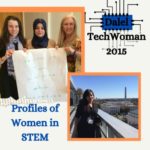
TechWomen alumnae offer advice and inspiration for TechGirls
Fellow(s): Azhar Mambetova, Dalel Mansour, Faten Khalfallah, Ghada Ameen, Nisreen Deeb, Sara Dib
Country: Algeria, Egypt, Kyrgyzstan, Lebanon, Tunisia
Cohort: 2013, 2015, 2018, 2019
Policy Area(s): Economic Impact, Education Diplomacy/Mentoring, Empowering Women and Girls, Entrepreneurship, Environmental Sustainability, Professional Growth, Youth Engagement
Recently, TechGirls created a resource for TechGirls participants and girls interested in STEM fields to hear from TechWomen fellows, receive mentorship and learn about careers in STEM. Profiles of Women in STEM features TechWomen fellows from Algeria, Egypt, Kyrgyzstan, Lebanon and Tunisia who created videos sharing their career journeys and the lessons they learned along the way.
Fellows Azhar Mambetova (Kyrgyzstan, 2019), Dalel Mansour (Tunisia, 2015), Faten Khalfallah (Tunisia, 2015) Ghada Ameen (Egypt, 2018), Nisreen Deeb (Lebanon, 2013) and Sara Dib (Algeria, 2019) participated in the initiative, highlighting their career wins and challenges, and offering advice for girls who are curious about STEM. “I chose to teach in technology because I wanted to inspire others…and you can inspire others too,” said Faten, who also gave advice for finding a career in STEM: “I advise all the TechGirls, all the girls, to discover many domains and many subjects. I advise them to choose the career that you love,” she said. Azhar chronicled her career in banking and fintech, speaking about what drives her to mentor others: “In my career, I hadn’t had a lot of role models…and at some point, I decided I can become one,” she said. Nisreen presented on her experience as a woman in tech, encouraging girls to raise their voice, ask for help and give back to their community. “I’m really proud to be a woman in tech,” she said. “Why? Because we can inspire, we can give back to our community and we can help other people.”
Report Date...: 7/13/20

Fellow completes Open Africa Power Program
Fellow(s): Sharon Marerwa
Country: Zimbabwe
Cohort: 2019
Policy Area(s): Environmental Sustainability, Professional Growth
After her TechWomen mentorship at SunPower, 2019 fellow Sharon Marerwa was compelled to continue to expand her skillset, grow her network and work to address Africa’s energy challenges. This past February, she was among 60 young African energy leaders to participate in the Open Africa Power Program, a venture that partners with African universities to empower participants with technical, regulatory and business skills in the sustainable development sector. She graduated from the program this week, ready to use her skills to effect change on the African continent.
Sharon, a power planning and research engineer, built upon her TechWomen experience as an OAP fellow. “TechWomen taught me to be connected to the right people, identify as a global citizen and think globally,” she said. “It’s now my blood to learn and be in touch with new trends in the industry, innovate with purpose, design for restorative economics and make a better world.” During the six-month program, Sharon learned how to maximize energy impact in Africa through delivering and expanding affordable and sustainable energy services. With her new business skills, she hopes to contribute to unlocking Africa’s sustainable future. “Africa is facing energy challenges that require a new generation of young, skilled and talented leaders to take it upon themselves, lead from the front and electrify Africa,” she said.
Report Date...: 6/29/20

Fellow represents Algeria on global smart cities panel
Fellow(s): Ouafa Benterki
Country: Algeria
Cohort: 2012
Policy Area(s): Economic Impact, Entrepreneurship, Environmental Sustainability, Professional Growth
This month, 2012 fellow Ouafa Benterki joined other senior executives on a panel at the G-20Y Summit, a gathering of international tech leaders and entrepreneurs. The live session brought together experts to talk about the Smart City concept and how to make smart cities inclusive, safe and scalable.
Ouafa is the CEO and founder of MTY Intelligent Software, a technology startup that provides data analytics and localization services. It’s also the first Algerian startup to focus on artificial intelligence. During the session, Ouafa and the other panelists spoke about the key technologies that enable smart cities including AI, IoT, drones and more. They also discussed the challenges that arise when governments and municipalities deploying smart city innovations, sharing their insights on issues of privacy, ethics and trust.
Report Date...: 6/22/20

Fellow featured for innovative work in green energy
Fellow(s): Charity Wanjiku
Country: Kenya
Cohort: 2017
Policy Area(s): Economic Impact, Empowering Women and Girls, Entrepreneurship, Environmental Sustainability, Professional Growth
This week, 2017 fellow Charity Wanjiku was featured in an article for Ensto, a green tech company based in Finland. Charity is the founder of Strauss Energy, a firm that brings green energy products to off-grid communities in Kenya. The article highlights Strauss’s innovative roofing tiles that serve a dual function, both roofing and powering homes that did not otherwise have access to electricity.
In the article, Charity speaks about her career journey, chronicling the challenges she faced as a woman entering a male-dominated field. Although she was discouraged from pursuing architecture, she persisted, graduating with only five other women in her class. “Women number roughly half the planet’s population, and if we don’t use them it’s like we’re playing with only half the team,” she says. She also shares a challenge she gives her audiences when public speaking, calling on them to curate a three-pillared life philosophy based off of three-stone cooking culture in Africa. “I challenge you to find your three stones,” she says. “If you do that, everything else will align itself.”
Report Date...: 4/6/20
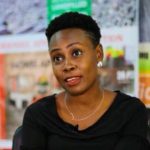
Fellow named to the 100 Women Creating A Better Africa list
Fellow(s): Mide Ayeni
Country: Nigeria
Cohort: 2017
Policy Area(s): Economic Impact, Education Diplomacy/Mentoring, Empowering Women and Girls, Entrepreneurship, Environmental Sustainability, Professional Growth
This month, 2017 fellow Mide Ayeni was recognized for her work building sustainable cities and communities on the 100 Women Creating A Better Africa list, an initiative created in commemoration of International Women’s Day. The campaign was organized by WeForGood International, a sustainable development consulting firm that focuses on fulfillment of the UN Sustainable Development Goals and the African leaders who are leading the way.
Mide is the founder of Pearl Recycling, a social enterprise that collects waste such as plastic, car tires, newspapers and other recyclables and trains youth and women to transform them into furniture and upcycled items. WeForGood recognized Mide for her efforts in addressing SDG 11, Sustainable Cities and Communities.
Recently, a Ford Foundation grant allowed Mide to expand Pearl Recycling’s programs and train 100 young women in Lagos in eco-friendly furniture making. She also plans to equip 20 Nigerian public schools with 400 ergonomic classroom chairs made from recycled materials, as well as train 800 young students on waste re-use in Lagos.
Report Date...: 3/30/20
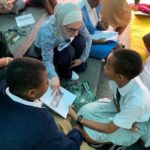
Delegation shows young students the possibilities in STEM
Fellow(s): TechWomen delegation trip to Rwanda
Country: Rwanda
Policy Area(s): Economic Impact, Education Diplomacy/Mentoring, Empowering Women and Girls, Entrepreneurship, Environmental Sustainability, Professional Growth, Special Report, Youth Engagement
On day two of the delegation trip, mentors and fellows met with girls from 10 secondary schools throughout Kigali for a for a full day of hands-on workshops meant to spark creativity, exploration and learning. Together, mentors and fellows led small-group sessions in electronics, engineering, digital media, motherboards, pitch training, design thinking, creative brainstorming and more. In the digital media session, groups of girls used Adobe Spark to create videos on themes of their choosing; in the engineering and architecture session, students used the basic principles of bridge engineering to create their own straw bridges using scissors, straws and tape; in the electronic circuits room, groups of students created LED flashers with sound and experimented with micro:bit hardware.
In all-group sessions during the afternoon, mentors led students through interactive activities that demonstrated the principles of design thinking and creative brainstorming. “There’s no bad idea in brainstorming,” said mentor Molly Glauberman of One Medical. “And when you involve more people, your ideas will get even better.” As mentor Tina Shakour led a pitch training, she reminded the students to make eye contact, tell a compelling story, and – mostly importantly — have fun. After, students split into groups to create one-minute pitches on solutions that can bring more resources to schools. Although just a few teams were asked to present, the students were so eager that ultimately every team came on stage and presented with clarity and confidence. 2018 fellow of Kenya Salome Gathoni closed out the day, inspiring everyone in the room to pursue their curiosities, follow their talents and work hard for their goals. “While we are strong, together we are stronger,” she said. “And together our voices will change the world. You see a girl — we see the future.”
Report Date...: 2/24/20

